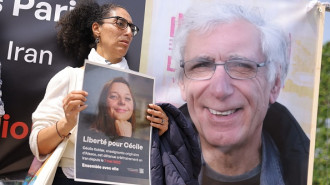Mediators push for Gaza truce in Cairo talks, differences remain as heavy fighting rages
Mediators in Cairo made a renewed push for a Gaza ceasefire, but differences remained as fighting raged on in the Palestinian territory gripped by desperate food shortages.
US, Qatari and Hamas envoys travelled to Cairo for the latest effort towards a six-week truce, stepped-up aid deliveries and the exchange of hostages for Palestinian prisoners.
But sticking points remained, including a Hamas demand that the Israeli armed forces entirely withdraw from the Gaza Strip after almost five months of devastating war which has killed over 30,000 people.
And Israel, which has so far announced no plans to join the Egypt talks, has demanded Hamas provide it with a list of all 130 remaining captives, including more than 30 it fears are dead.
Despite the latest push to halt the war in the territory, Israeli bombing and urban combat again rocked Gaza, home to 2.4 million people, most of whom have been displaced.
Another 90 Palestinians were killed within 24 hours which put the war's overall death toll at 30,410, mostly women and children.
An Israeli siege on Gaza has sparked dire warnings from the United Nations of famine, leading the United States to start airdropping food rations into Gaza on Saturday.
Jordan and some other countries have already done so.
Screaming Palestinian children ran toward food parcels that drifted on black parachutes onto the Mediterranean beach.
At least 16 children have died of malnutrition in recent days as "famine spreads" in Gaza's north, said health ministry spokesman Ashraf al-Qudra.
Gaza's desperation was grimly highlighted last Thursday when more than 100 people were killed by Israeli forces who opened fire around a convoy of aid trucks.
Gaza health officials said Israeli forces opened fire into the crowd, causing a "massacre", while Israel's army said most victims were trampled or hit by trucks in a chaotic crush for food aid.
A UN team that visited some of the wounded in Gaza City's Al-Shifa Hospital on Friday saw a "large number of gunshot wounds", said UN chief Antonio Guterres's spokesman Stephane Dujarric.
The UN Security Council on Friday voiced concern over Gaza's "alarming levels of acute food insecurity" and urged "the immediate, rapid, safe, sustained and unhindered delivery of humanitarian assistance at scale".
Pope Francis called for Gaza civilians to be given "safe access to the humanitarian aid they urgently need", telling the faithful at the Vatican that he supports an "immediate ceasefire" and hostage release.
Mediators have been scrambling to lock in a truce before Ramadan, the Muslim fasting month that begins in around one week.
Envoys from the United States, Qatar and Hamas have arrived in Cairo, Egyptian state-linked media reported Sunday.
A US official, speaking to reporters late Saturday, had said "there's a framework deal" for a ceasefire which could start "today if Hamas agrees to release" elderly, women and ill hostages.
"The Israelis have more or less accepted it," the administration official said. "Right now, the ball is in the camp of Hamas."
A Hamas official said that, if Israel were to meet its demands, this would "pave the way for an agreement within the next 24-48 hours".
Osama Hamdan, a Lebanon-based Hamas official, told Qatar's Al-Araby TV that the group insisted on a complete, rather than "temporary", ceasefire and on "ending the aggression against our people".
Israeli Prime Minister Benjamin Netanyahu has so far rejected pulling troops out of Gaza before Hamas is "destroyed".
The Hamas official also said the group would demand "the entry of at least 400 to 500 trucks per day" carrying food, medicine and fuel as part of a truce deal.
Israel had yet to confirm that it has accepted the truce plan or whether it would attend the Cairo talks.
Netanyahu has faced mounting calls to secure the release of the hostages, from their desperate families and a resurgent anti-government protest movement.





 Follow the Middle East's top stories in English at The New Arab on Google News
Follow the Middle East's top stories in English at The New Arab on Google News

![The law could be enforced against teachers without prior notice [Getty]](/sites/default/files/styles/image_330x185/public/2178740715.jpeg?h=a5f2f23a&itok=xMdFOAIF)
